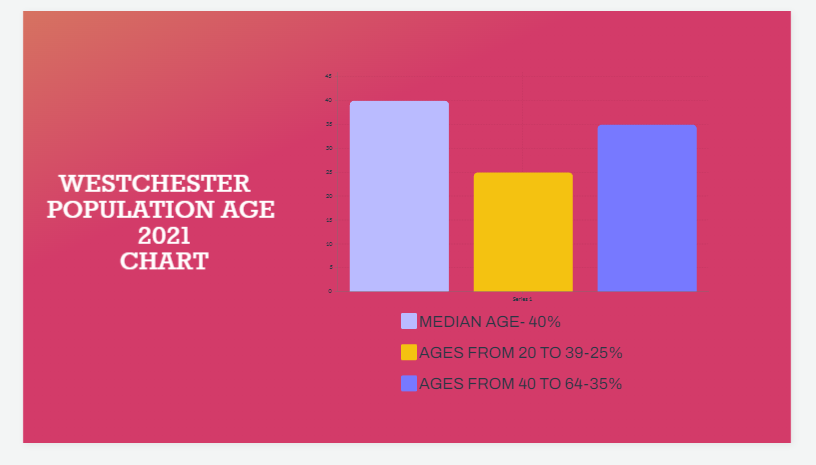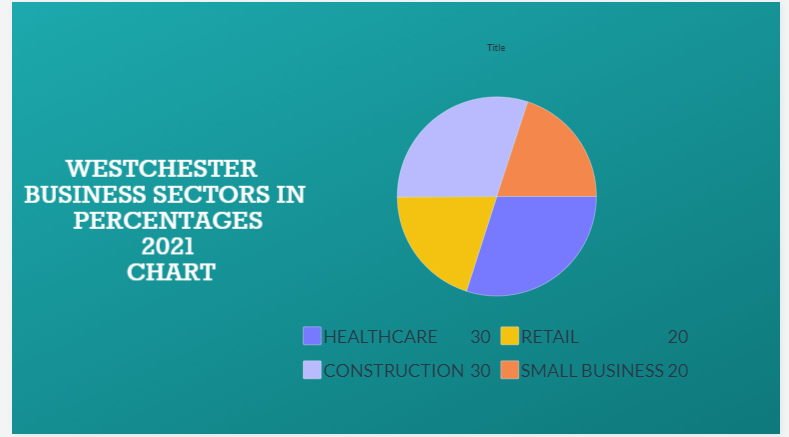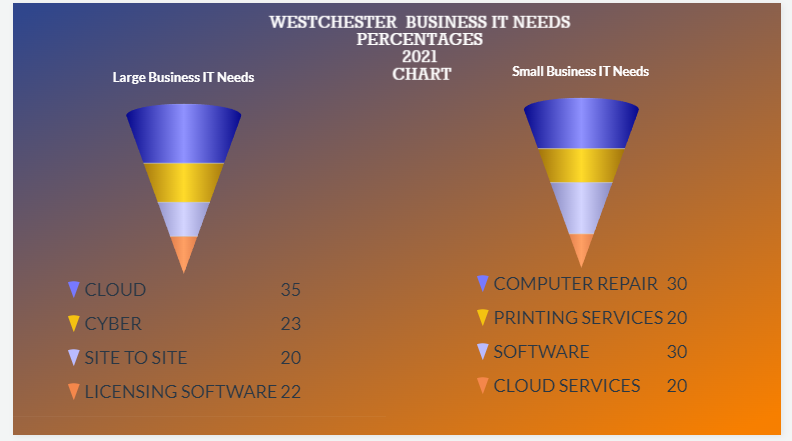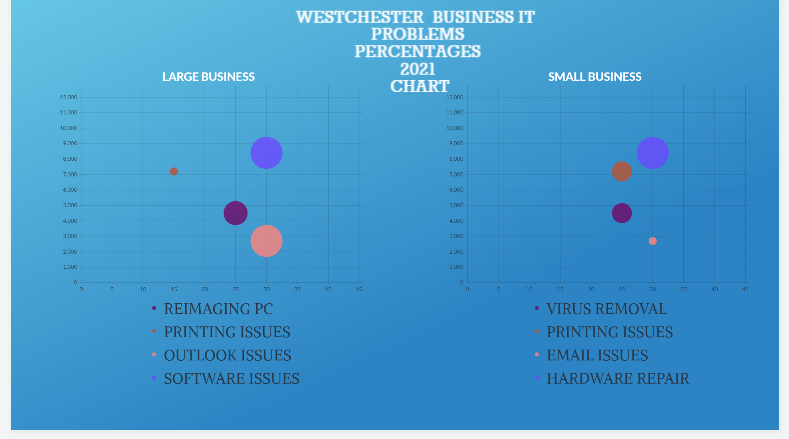An Overview on How Westchester Businesses Use IT Services
As Westchester is the county where I currently live, work and support my clients with my IT services, I have decided to spend some time studying the business sectors of the county and analyze data related to how businesses operating in this county employ IT services.
As more people have moved from New York to Westchester county because of the 2020 pandemic, the county administrators have been building momentum on new initiatives, such as boosting the biotech sector and developing more industrial initiatives. Furthermore, what has attracted people to move to Westchester in the recent years was a great school system and the vicinity to New York City which makes the commute to Manhattan not an heavy undertaking.
At first glance, Westchester county has about one million residents, whose median age is about 41 years old and according to the latest census, the resident age is divided in the following percentage:

40% of the Westchester residents are of median age, 25% are between 20 to 39 years old and 35% have ages between 40 to 64.
But what about the businesses that operate in Westchester? After having pulled some data, I can confirm that there are not only Fortune 500 companies doing business here but there is also also a decent amount of retailers and small businesses as per the chart below:

Basically, there is a balance between mega cap companies and small businesses: large companies account for the 60% of the businesses, and 40% is taken by smaller entities.
Now, how all these business use IT or buy IT services? Apparently, I would hardly believe that the computer and networking needs of a large business are the same as those of a small retailer that has 3 or 6 computers and only one office location.
Let’s find out how different can be a large network from a small business network.
WHAT DOES A LARGE NETWORK NEED IN TERMS OF IT SERVICES?
- First of all, a large network is made of a lot of employees located in different offices. Usually Westchester large businesses are headquartered elsewhere in the US or Canada. The Westchester office of a large network is a branch office of a parent office. Those offices are connected together via cloud services and also have IT in house technicians who are constantly opening and closing IT support tickets after having resolved the issues they were asked to work on. In addition, large companies have site to site connections via VPN firewalls and other replications because network engineers designed a large business network to be as such in order to minimize downtime. Also, the programs that run on workstations and servers of a large network with hundreds of computers require adequate financial resources in terms of licensing and support.
WHAT DOES A SMALL BUSINESS NETWORK NEED IN TERMS OF IT SERVICES?
- In the IT world, a small business network is a network that ranges between 10 to 50 users and is spread across a couple of locations. As a result of this more agile structure, the IT needs of a small business network are mainly focused on hardware, computer diagnostics, troubleshooting and replacement. Also, in a small business environment I discovered that printers sometimes are more important than computers because printers are used when a project deadline is coming up or there is something very important to show the main supervising manager. Cyber and network security is picking up as topic in this sector but small business owners are not interested as much in cyber as users of a larger companies are. I think it has to do with users’ education and investment priorities.
The following chart shows how companies prioritize their IT investments in Westchester county:

As the above chart shows, cloud and cyber security are the main investments allocated by big companies, because the risks of having a network hacked are higher in a large environment than in a smaller business. In doing so, large companies spend a lot in educating users about security and cyber safety. IT departments of this sector are heavily involved in network and computer security with programs and webinars for employees and managers. On the other hand, a small operation focuses more on business continuity and hires IT consultants on retainer or on request. This approach minimizes the investment in IT resources but small business very often can suffer downtime for a period of time if the IT consultant is not available to come immediately on the premises.
Evidently enough, IT consultants working for both types of business face different problems they are called to work on and the following chart shows the main issues that occur in both environments:

The IT issues that computer technicians face in a large business are more related to reimaging pcs because of the large turnover rate and smaller problems such as outlook malfunctioning. Small businesses, on the other hand, are more prone to get infected, more inclined to not spend on security and users training. Small business use computers to accelerate income that derives from their operation and need more hardware repair and printing support than a larger environment, where computer replacement happens at a faster rate.
As you may have realized, the difference between the two categories depend on the investments: large companies employ tech support to educate users on how to be safe online and avoid email spoofing, whereas small businesses tend more to get the most out of their devices without questioning if the use of a laptop or an Iphone can be done in a safe environment where all users observe the security policy the owner of the business has eventually set up in cooperation with the IT consultant he trusts.